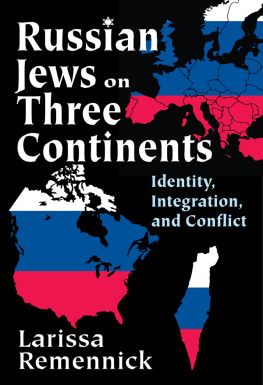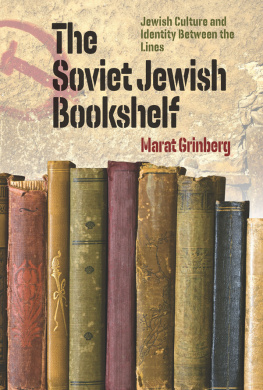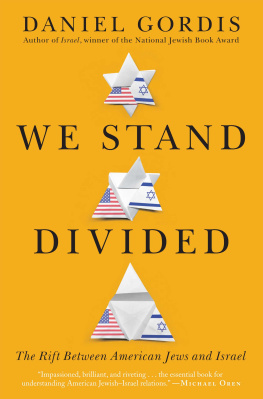First published 2007 by Transaction Publishers
Published 2017 by Routledge
2 Park Square, Milton Park, Abingdon, Oxon OX14 4RN
711 Third Avenue, New York, NY 10017, USA
Routledge is an imprint of the Taylor & Francis Group, an informa business
Copyright 2007 Taylor & Francis.
All rights reserved. No part of this book may be reprinted or reproduced or utilised in any form or by any electronic, mechanical, or other means, now known or hereafter invented, including photocopying and recording, or in any information storage or retrieval system, without permission in writing from the publishers.
Notice:
Product or corporate names may be trademarks or registered trademarks, and are used only for identification and explanation without intent to infringe.
Library of Congress Catalog Number: 2006052605
Library of Congress Cataloging-in-Publication Data
Remennick, Larissa I.
Russian Jews on three continents identity, integration, and conflict / Larissa
Remennick.
p. cm.
Includes bibliographical references.
ISBN 0-7658-0340-2 (alk. paper)
1. Jews, RussianIsraelSocial conditions. 2. Jews, RussianNorth
AmericaSocial conditions. 3. Jews, RussianGermanySocial
conditions. 4. JewsIdentity. 5. Social integration. 6.Immigrants
IsraelSocial conditions. 7. ImmigrantsNorth AmericaSocial
conditions. 8. ImmigrantsGermanySocial conditions. 9. Jews
Cultural assimilationIsrael. 10. JewsCultural assimilationNorth
America. 11. JewsCultural assimilationGermany. I. Title.
Ds113.8.R87R46 2006
305.892'4047dc22
2006052605
ISBN 13: 978-1-4128-4888-6 (pbk)
ISBN 13: 978-0-7658-0340-5 (hbk)
I dedicate this book to my informants, fellow immigrants of former Soviet origin, who are spread today across the globe. I am grateful for your time, trust, and frankness of your narratives. I wish you all the best in your new lives in Israel, America, or Germany.
Contents
Introduction Russian Jews on Three Continents:
Ten Years Down the Road
4. Being a Woman is Different Here: Changing Attitudes
towards Femininity, Sexuality, and Gender Roles among
Former Soviet Women Living in Greater Boston
6. The Promised Land in the Heart of Europe:
Identity and Social Incorporation among Former
Soviet Jews in Germany
7. Lost Relatives or Strangers? Jews or Former Soviets?
In Search of the Common Denominator
Preface to the Paperback Edition
Russian Jews on Three Continents:
Identity, Integration, and Conflict
About seven years have passed since the first hardcover edition of this book was prepared for press. In such a dynamic field as immigration and integration, each lapsed year means new political events, changes in economic cycles, and the ensuing shifts in global and local migration policies. These macro-level changes have to some extent redrawn the map of opportunities and challenges for my target communityex-Soviet Jewish migrants in Israel and in the West. Since 2006, an estimated 60,000 ex-Soviet Jews have changed their place of residence, either emigrating from the former Soviet Union (FSU) or relocating from one destination country to another (e.g., from Israel to America or from Germany to Israel). Although this scope of migration movement seems minor in comparison to the mass exodus of the early 1990s, it can still have a tangible impact on both sending and receiving societies, especially if those migrants are endowed with valuable human capital. The first edition of my book juxtaposed the integration experiences of ex-Soviet immigrants in their new homelandsIsrael, US, Canada, and Germanysome fifteen years after the inception of the late- and post-Soviet Jewish emigration. By now our timeline has extended further, and most immigrants have become longtimers with over 20 years of experience as Russian Israelis, Russian Americans, and carriers of other hyphenated identities. The goal of this brief preface is to offer the reader some useful leads to recent developments on the virtual Russian street of Israel (and other host countries), and to suggest further readings published after 2007. The majority of recent publications listed in the end of this preface follow up the experiences of Russian Israelis in different domains (religion, the emerging second generation, the experiences of non-Jewish Olim, and more) or offer comparisons between Russian immigrants in Israel and Germany. This regional bias reflects the continued interest in Russians among social scientists in Israel versus the unfortunate paucity of recent research and writing on this immigrant group in North America and Europe.
In the Israel of 2012, Russian Olim of the 1990s are no longer perceived as newcomers, or even as a special category within the Jewish majority, with the respective decline in media coverage, targeting by politicians in election campaigns, and research funding to study their integration. By now Russians are construed as regular Israelis with an accent (like most other veteran immigrants in this country), although their belonging to the Ashkenazi middle class is still debated. Most of them have found their economic and social foothold, mastered basic Hebrew, and have learned to navigate Israeli institutions. Public spotlight has moved toward other groups considered troubled, deviant, or treated unfairly by the majority (depending whom you ask), such as Ethiopian youth, labor migrants from Asia, and most recentlyso-called infiltrators from several African countries stricken by wars and poverty. Israels internal political agenda is as loaded as ever and its international standing is increasingly challenged. In this context, the 20-year anniversary of the inception of the Great Russian Aliyah in 2010 went almost unnoticed by the establishment and broad Israeli public, with only a few academic events and publications dedicated to this occasion (including a special issue of Israel Affairs that I collected and edited). Although the high momentum of Russian politics in Israel has passed, a few political actors originating in the ranks of the Russian Aliyah have reached national prominence after the 2009 elections (particularly Avigdor Lieberman as Foreign Minister and Zeev Elkin as head of the majority coalition in the Knesset, with three other Russians holding less important ministerial posts). The Russian vote was as salient as before in bringing to power the right-wing coalition and specifically the Israel Beiteinu party headed by Lieberman. Quite a few high-ranking professionals with a Russian accent are now visible in Israeli science, medicine, the industry and business community, the arts, and academia; the only institutions where Russians have not yet ascended to prominent or leading positions are the judiciary and the military corps. There is little doubt that generation 1.5 and especially the second generation of Russian Israelis will sooner or later penetrate the higher ranks of these bastions of Israeli statehood.
These are probably the most tangible indications of the completed transition period and the beginning of the new, permanent phase in the lives of Russian Israelis. Despite frequent allegations of their intense yerida (i.e., emigration from Israel, either back to the FSU or to the West), about 90 percent of the post-1990 arrivals have remained in Israel (Della Pergola, 2011). Though there are visible achievements of selected Russians at the top of the social pyramid, the overall living standards of this group remain lower compared to these of other Israeli Jews: the median family income of Russian Israelis is 25-30 percent below the average; fewer families own their homes; fewer travel abroad, etc. This reflects a constellation of several factors pertaining both to the Israeli context (economic cycles, small labor market, shrinking welfare benefits) and to immigrants characteristics, including inapplicable occupational skills, advanced age structure, a high share of single-parent families, and residence in Israels geographic and social periphery (Gorodzeisky and Semyonov, 2011; Remennick, 2012a). The downward socio-economic mobility of the parental generation has negatively affected the lives of their children born or raised in Israel (Remennick, 2012 a, b). Our recent research indicated that some older schoolchildren belonging to the second generation still experience identity qualms (many of them identifying as Russian), struggle at school, and face exclusion by their Sabra peers (Remennick and Celnik, 2011). All of these issues hampering the integration of Russian youths are especially prominent among the ethnically-mixed and non-Jewish segment torn between their homeland (the FSU) and Israeli-related identities and loyalties (Prashizky and Remen-nick, 2012; Remennick, forthcoming). At the same time, young Russian adults of generation 1.5 exhibit today a much higher social engagement with their native peers (vis--vis their parents), with a gradual increase in relationships and marriages between Sabras and Russians (Remennick, 2009b; Prashizky and Remennick, 2012).






